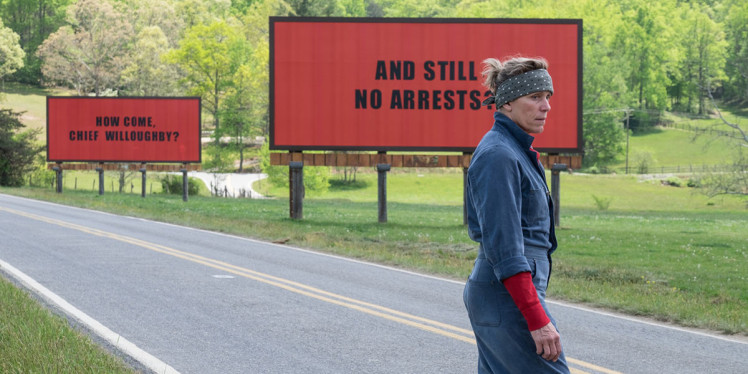At Filmhouse, Edinburgh from Fri 12 Jan 2018
In the age of digital cinema it’s baffling why films continue to be released Stateside months in advance of their appearance on this shore. After glowing reviews since November and a successful Golden Globes, Three Billboards Outside Ebbing, Missouri has attracted something of a backlash and disembarks in the UK with enough baggage to fill a Boeing. Despite some of these criticisms being entirely justified, Martin McDonagh’s latest is a dense, profane tragicomedy of revenge and redemption at once blackly enjoyable and surprisingly emotional.
Frances McDormand is Mildred Hayes, a mother still grieving after the unsolved rape and murder of her teenage daughter Angela nearly a year earlier. Frustrated, she rents the titular unused billboards and puts up the bullish exhortation, “Raped While Dying,” “And Still No Arrests?” “How Come Chief Willoughby?” Bill Willoughby (Woody Harrelson) is the popular Sheriff, whose terminal cancer appears to be an open secret. While he’s sympathetic to Mildred, there are no leads and poor Angela’s fiery demise is cooling to a cold case. The rest of the town aren’t so patient with Mildred’s stand, least of all the dim-witted, racist officer Dixon (Sam Rockwell), whose vendetta begins to match Mildred’s in its intensity.
Three Billboards is a tonal roller coaster of McDonagh’s usual firecracker dialogue, sudden spurts of nasty violence, punishing emotional punches and social invective. McDonagh’s style is as blunt as his characters, and it’s there that the problems lie. This is a film in which his characters take potshots at every social issue, whether relevant to proceedings or not. At one point Mildred takes a priest to task about historical sex abuse by the clergy in a long monologue. A worthy topic, but not one that has any bearing on proceedings other than being unnecessary polemic. Where a subject is relevant, such as Dixon’s much-mooted torture of black prisoners, there isn’t enough dramatic meat to back this up. He’s depicted as racist, but none of the black characters are foregrounded enough in the story for this to work. The argument that Dixon’s racism is used as as a plot point from which to launch his sudden (and, according to some critics, unconvincing) redemptive arc is a valid one.
Yet, despite these issues and more besides (and many more will be discussed in the run up to the Oscars), Three Billboards works mainly on the devastatingly good performances. The wonderful McDormand is on Fargo and Olive Kitteridge form and should surely nab Best Actress in February. Rockwell brings humanity to the otherwise charmless Dixon. Harrelson’s dignified, paternal Willoughby also chimes at the heart as a man trying to do the best by his town, for better or worse. Yes, it slightly wastes great supporting players like Abbie Cornish and Peter Dinklage, and there are certain structural problems, but it’s such a potent work; full of confidence and a sense of moral outrage, even if it’s own morality is murky, that it rides roughshod over its obvious shortcomings. It’s not quite up there with the streamlined, feral economy of his debut In Bruges, but very little is.
